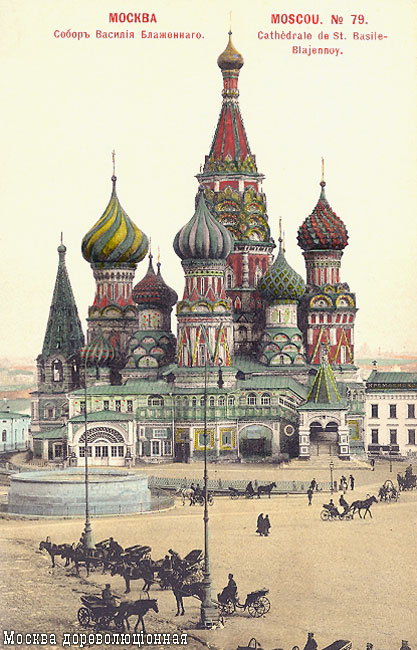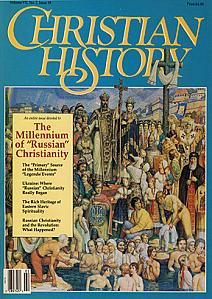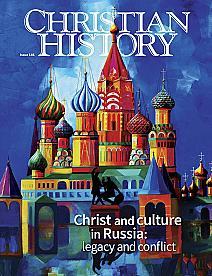STALIN TRIED TO RUIN AND THEN TO RUN ORTHODOXY

[Above: Pre-revolutionary Russian postcard of Saint Basil’s Cathedral, Moscow—public domain, Wikimedia File:Vasilij Blazh.jpg]
THE RUSSIAN ORTHODOX CHURCH took a terrible beating after the Bolsheviks seized power in 1918. Marxism repudiates Christianity. Stalin did not improve the situation after he came to power. Persecution was so bad that many Russians welcomed the Nazis as liberators during World War II. To regain the allegiance of his Russian Orthodox population, Stalin had to ease restrictions on the church and restore many of its properties and powers.
At the end of World War II, Stalin dreamed of uniting all of the non-Roman-Catholic churches of the world under the leadership of the Moscow Patriarch. He pushed for a congress of world churches. The plan never got off the ground because divisions between denominations were too great, and denominational leaders were leery of the Soviet Union because of its record of religious persecution.
When the idea of a world congress of churches failed, Stalin and his ministers determined to bring all the Eastern Orthodox churches of the world under Moscow’s umbrella. Even this less grandiose project proved to be impractical. Efforts fell through in 1947, largely because of the developing cold war. However, on this day, 8 July 1948, an Orthodox conference did convene in Moscow. The timing coincided with the five hundredth anniversary of Russian Church independence from Constantinople.
Moscow hoped the delegates could settle a number of issues, including a switch to the Gregorian Calendar. (Many regional Eastern Orthodox churches still employ the Julian Calendar for church functions, even today.) Russian Orthodox leaders also wanted to condemn breakoff groups such as those in America and those believers living in exile who insisted that Russia should be ruled by descendants of the Tsars. They also planned to characterize Roman Catholicism as heretical and pro-fascist.
In the end, Moscow’s objectives failed. Regional churches rejected its decisions, arguing that only the Ecumenical Patriarch (the “universal” patriarch of Constantinople) could convoke a pan-Orthodox conference to rule on important issues.
Stalin’s maneuvers therefore produced unexpected consequences; it forced him to restore some of the prerogatives of the Russian Orthodox Church and to allow the church a greater measure of freedom than it had experienced for decades. It also prompted the West to take more notice of Orthodoxy and even to use its political clout to depose the patriarch of Constantinople (Istanbul) and get a western-friendly patriarch elected in his place.
—Dan Graves
----- ----- -----
Two issues of Christian History that present background on the church in Russia are Christian History #18, The Millennium of “Russian” Christianity







